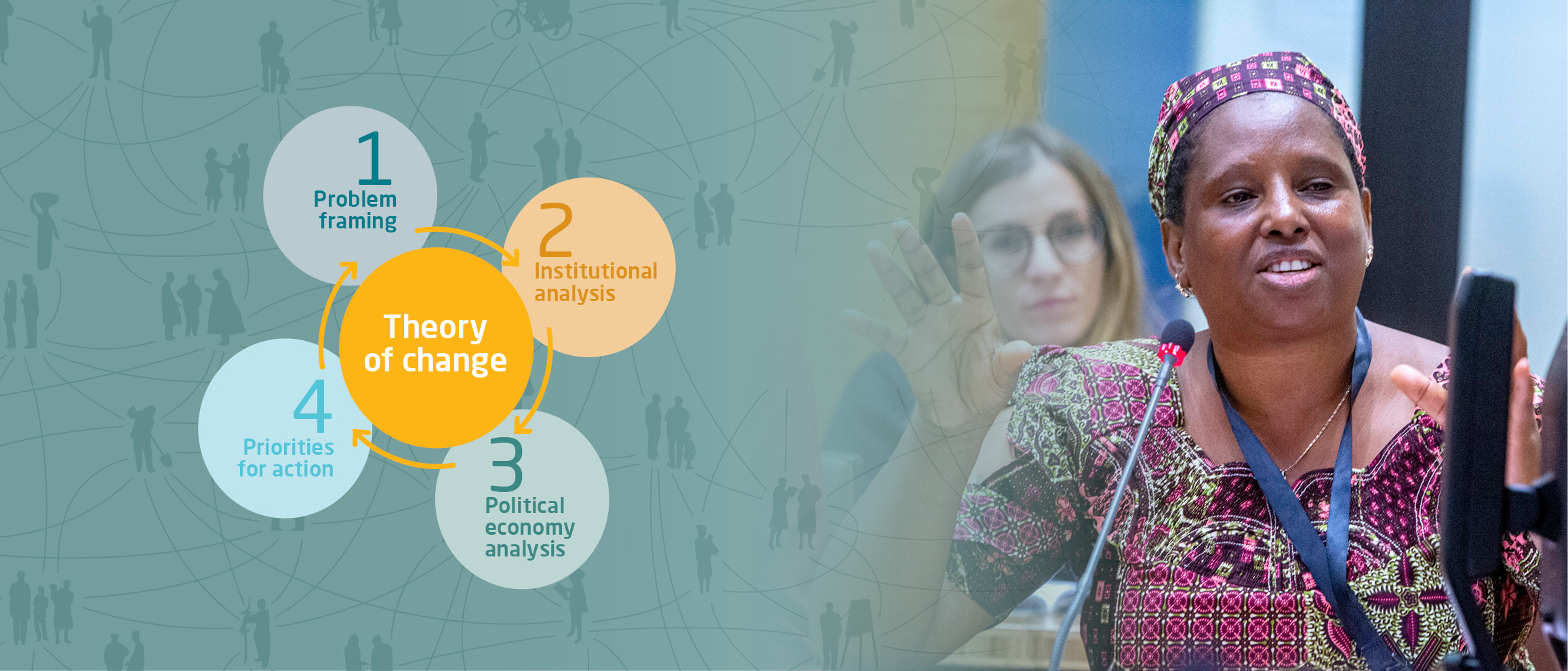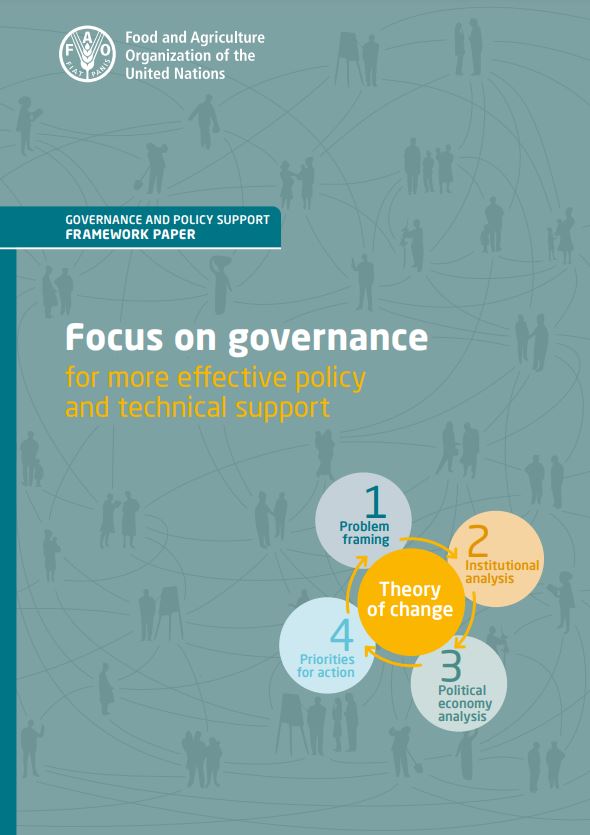Focus on governance: A framework for more effective policy and technical support
11:00 - 12:30 CEST
Hybrid Event, 24/05/2023

Recognizing the central importance of agrifood systems to achieve most Sustainable Development Goals (SDGs) and to challenge concerned stakeholders and policymakers to work holistically across sectors and levels, the 2030 Agenda has made governance for food and agriculture one of the most challenging priorities of our times. Governance along with institutions and human capital has been recognized by FAO’s Strategic Framework as one of the four accelerators of the Organization’s impact to meet the SDGs.
Focusing attention on governance in a given context is critical to determine which and how policies and actions will be implemented on the ground, what are the trade-offs, who will be affected, and how. Governance analysis helps professionals and policy practitioners in all disciplines recognize underlying conflicts and challenges, processes and capacity bottlenecks, power and information asymmetries.
Launching FAO’s framework paper on governance, this event will focus on the ways policy and development experts and practitioners can leverage governance to offer more effective and realistic support to countries to advance transformative change. It will also share experiences from countries where it was used, in view to help assess the risks and opportunities, and formulate strategies to achieve transformational change in agrifood systems.
The event will be in English with interpretation in French.
Opening remarks
- Máximo Torero, Chief Economist at FAO
Presentation: Four-phase framework for governance analysis
- Dubravka Bojic, Programme Officer at FAO
Panel: Governance in action
- Anang Noegroho, Director of Food and Agriculture, Indonesia’s Ministry of Planning (BAPPENAS), and National Convener of the UN Food Systems Summit
- Abdelhamid Mnajja, Director-General Ad Interim of Tunisia’s General Directorate for Rural Engineering and Water Development (DGGREE)
Q&A
Closing remarks
- Michael T. Clark, Former FAO Senior Coordinator, Governance and Policy
---
Moderation: Günter Hemrich, Senior Adviser at FAO
Article
Focus on governance: the crucial premise to transform agrifood systems
26 June 2023 - Understanding and improving agrifood systems governance has never been so important as today, in a world that faces multiple, interconnected challenges spanning hunger, food prices’ volatility, the climate crisis and armed conflicts. To address complex issues, equally complex solutions are required.
“By focusing on governance, we are looking at ways actors are enabled to participate in the decision-making processes, and at how and how well the existing institutions invest in the capacity for effective and inclusive policy implementation,” stressed Máximo Torero, FAO’s Chief Economist, in his opening remarks at the event launching the Organization’s framework paper on governance on 24 May 2023.
Bringing together insights from FAO’s rich experience and knowledge and global literature, the publication Focus on governance for more effective policy and technical support introduces a methodic four-phased process integration of governance analysis supporting formulation and implementation of interventions at country, regional and global levels, and sustained by strengthened coordination and participation mechanisms.
“This is an iterative process. Governance never ends, and problems are never fully solved,” highlighted Dubravka Bojić, Programme Officer, Governance and Policy, FAO, and one of the publication’s co-authors. “But the integration of governance analysis in the work of FAO and policy practitioners at all levels pays back in terms of ownership and sustainability of results. Investing in governance can provide realistic information about the existing potential for change and help build a coalition of actors in support of the desired change.”
The paper also provides a review of recent trends in expert thinking about governance for sustainable development and highlights FAO’s conceptual contributions to governance in the areas of FAO’s mandate. The publication is aimed at experts and practitioners in FAO and beyond.
“It’s not only a framework that takes you through the four phases. If you look at the full report, you will also find a lot of insights in terms of how the governance concept has evolved over time, and how it is applied across different sectors and situations. There is a very rich historical analysis that you will also find in the full report,” underlined Günter Hemrich, Senior Advisor at FAO and moderator of the event.
Governance in action
FAO’s Focus on governance proposes a common reference for agrifood experts and policy practitioners confronted by governance issues in a wide variety of contexts. During the launch event, government representatives shared their experiences in governance work undertaken with FAO support in advancing sustainable development goals.
In Indonesia, in collaboration with FAO, the Government has engaged in an innovative modelling exercise around synergies and potential trade-offs between economic, environmental and social objectives and targets in the process of transforming agrifood systems in the country. Through the support from FAO’s Flexible Voluntary Contribution, this initiative has also contributed to organizing and facilitating the first broad set of participatory and inclusive national and sub-national dialogue sessions setting common priorities for agrifood systems transformation, and efforts are being made to keep the stakeholders continuously involved in the planning and implementation phase.
“We are developing a multistakeholder platform to consult with academia and interested professionals to support our National Strategic Pathway for Food Systems Transformation,” said Anang Noegroho, Director of Food and Agriculture at Indonesia’s Ministry of Planning.
While the case from Indonesia brought a national-level perspective, a representative from the Government of Tunisia showcased a process and experience about water governance at the sub-national level, more specifically, in the Lower Medjerda Valley. Using FAO’s governance framework, a team of experts managed to identify the key issues fueling local water scarcity and degradation – a long-lasting challenge in the region that jeopardizes the country’s agriculture and food security. The Government is now promoting efforts to broaden participatory actions to ensure more sustainable and equitable water governance.
“Thanks to the strategies we have put in place, we have ensured a sharing of responsibilities between the state and local actors,” stated Abdelhamid Mnajja, Director-General Ad Interim of the General Directorate for Rural Engineering and Water Development within Tunisia’s Ministry of Agriculture. In his view, engagement and participation of water users in resource management and governance is key for preserving the resource and ensuring its sustainable use.
In the horizon
The inclusion of governance analysis in FAO’s work helps to ensure the policies and interventions which could technically enhance transformation, are supported by the necessary strong institutional and multi-stakeholders’ ownership and commitment, thus strengthening effectiveness of support. To make the best use of it the framework can promote a new mindset for governance analysis across national, regional and global institutions, to support transformation towards more resilient, inclusive and sustainable agrifood systems.
“We can’t solve all the problems everywhere, all at once. It’s up to national authorities working with national constituencies to prioritize and recognize that the work of agrifood systems transformation is a work of years. And it’s a work that will touch everyone in profound ways,” pointed out Michael T. Clark, Former FAO Senior Coordinator on Governance and Policy, and one of the co-authors of the publication, in the event’s closing remarks.
In focus:
 | Focus on governance for more effective policy and technical support. Framework paper
Bringing together insights from FAO’s rich experience and knowledge and global literature, this paper introduces an operational four-phased framework for analysis and integration of governance analysis and action into formulation and implementation of interventions at country, regional and global levels. It also provides a review of recent trends in expert thinking about governance for sustainable development and highlights FAO’s conceptual contributions to governance in the areas of FAO’s mandate.
Arabic | Chinese | English | French | Russian | Spanish
|
